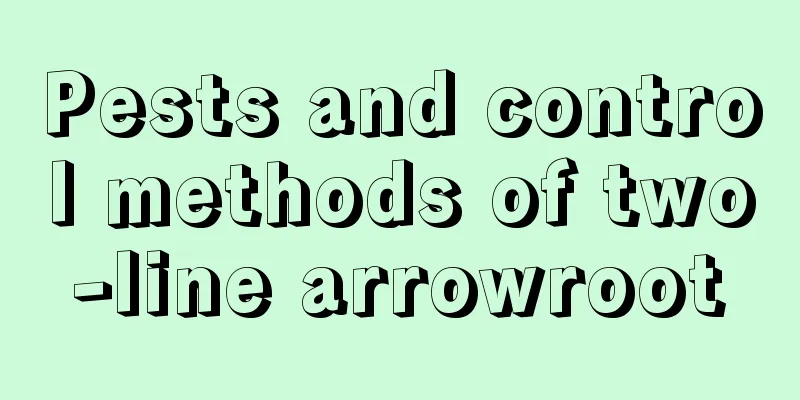Pests and control methods of two-line arrowroot

Pests of two-line arrowroot: scale insectssymptomScale insects are mealybugs with strong reproductive capacity and can reproduce multiple generations every year. May is the peak breeding period. The disease often occurs on the edges or backs of leaves, but it can also occur on the surface of leaves. Scale insects use their mouthparts to pierce the leaves and suck the juice of the two-lined arrowroot. In mild cases, the leaves will turn yellow and become old, affecting the growth of the plant. In severe cases, the leaves will gradually wither and fall off until the entire plant dies. The wounds bitten by scale insects are also easily infected by pathogens. Adult scale insects have a waxy outer shell, so pesticides cannot completely control the pests, making them difficult to control. Prevention and treatment methodsPesticides should be sprayed during the peak nymph stage. At this time, the nymphs have just hatched and the wax on their body surface has not yet formed. It is easier to kill scale insects with pesticides at this time. Use 1000 times diluted 40% oxydemeton-methyl, 1000 times diluted 50% DDT, 3000 times diluted 2.5% cypermethrin for spraying for prevention and control, spray once every 7-10 days, and spray 2-3 times continuously. Pests of two-line arrowroot: Red spider mitessymptomRed spider mites are relatively small and not easy to be found. They are reddish brown or orange in color. Once found, the damage they have caused is often already quite serious. Red spider mites use their mouthparts to absorb nutrients from leaves, causing an imbalance in the plant's water metabolism and affecting its normal growth and development. Red spider mites generally reproduce in an environment with higher temperature and lower humidity, and a single spider will do little harm to plants. Prevention and treatment methodsPlace the plants in a ventilated place, keep the humidity of the environment stable at above 40%, and spray water on the leaves frequently. Pesticides cannot completely kill insect eggs, so adults and nymphs must be controlled after the eggs hatch. You can use 1000 times diluted 20% trichlorodicofol emulsifiable concentrate or 1000 times diluted 40% oxydemeton-methyl emulsifiable concentrate for spraying. |
<<: Common pests of the dwarf ...
>>: Diseases and Pests of Chlorophytum comosum and Their Control
Recommend
The difference between acacia seeds and acacia beans
1. Leaf Difference The leaves of Abrus precatoriu...
Can spoiled lard be used as fertilizer?
Spoiled lard as fertilizer Spoiled lard can be us...
How to grow Sassafras
1. Soil: Sassafras grows well in deep, loose, wel...
The efficacy and function of Shatian pomelo
1. Prevent high blood pressure Pomelo can effecti...
How to trim a money tree to make it look good
When is the right time to prune a money tree? Mon...
Can mint prunings survive? How to propagate the cut branches and leaves?
Can mint cuttings be planted alive? Mint cuttings...
The efficacy and function of fairy fruit
1. Laxative The cactus is rich in cellulose, whic...
What is the nickname of tuberose?
Other names for tuberose The name tuberose is act...
What is Rice Krispie?
1. What is The rice popcorn is Australian rice po...
How long is the growth cycle of moss?
Moss growth cycle The growth period of moss is fr...
The efficacy and function of Thousand Buddha Hands
Suitable for viewing Just by hearing the name you...
What crops are suitable to grow in May?
What crops are suitable to grow in May? May is ex...
Is canna suitable for indoor cultivation?
1. Reasons for release (1) First of all, it is or...
How to fertilize Jasper plants
1. How often should you apply fertilizer? Jade pl...
Can figs grown indoors bear fruit in winter? (How to care for fig potted plants in winter)
Figs can not only be eaten as fruits, but also as...









